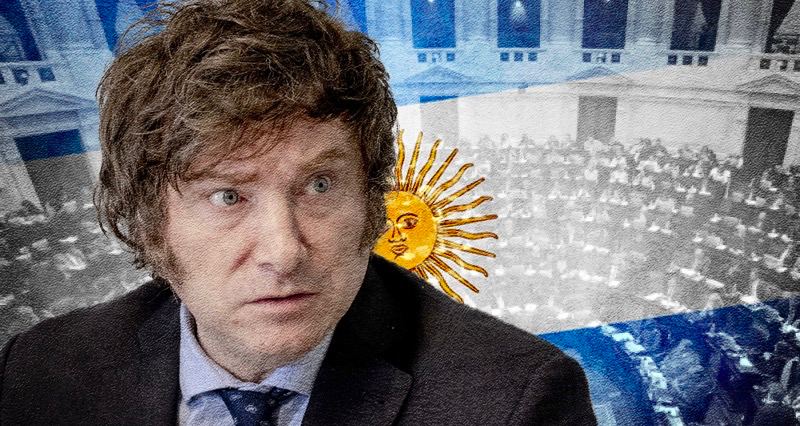By Úrsula Asta, Buenos Aires, Argentina
The government of Javier Milei in Argentina began with a package of regressive measures for the vast majority of the people. In the first weeks of his mandate, first, there was an accelerated economic deterioration in form of a mega devaluation of 118 percent and a sharp increase in inflation. Secondly, it issued the Decree of Necessity and Urgency (DNU) 70/2023, by which it modified more than 300 articles of current regulations and repealed others. Thirdly, he sent the bases bill or Omnibus law to the National Congress, which sought to deepen the transformation of the country by affecting hundreds of regulations in different areas, such as culture, economy, education, security and national companies. The bill was rejected.
What is the DNU 70?
The Decree of Necessity and Urgency, issued on December 20, 2023, in the national network, is a package that includes regulatory modifications and proposes the complete repeal of some laws, such as rentals, supply, gondolas, national purchasing, industrial promotion, commercial promotion, among others. It also aims to repress social protest and affects fiscal regulations, tax regimes, constitutional aspects, and changes to the civil and commercial code.
In labor matters, it imposes a profound flexibility in labor relations to the detriment of workers. This reform includes the reduction of compensation, extends trial periods, defunds unions and social works, promotes outsourcing and labor fraud, creates the hours bank, which limits the collection of overtime, in addition to restricting the right to strike and assemblies.
This last aspect, included in the fourth chapter of the DNU, is currently suspended by the Labor Courts, based on legal presentations from the CGT, CTA union centers and other organizations.
The country’s business groups are pushing for the application of this labor reform. In March, after learning that February inflation was more than 13 percent monthly and more than 276 percent annually, the government announced that it would release tax benefits for bringing retail products into the country from other countries: meat, fish, dairy products, fruits, vegetables, legumes, oils, beers, non-alcoholic drinks, toilet paper, toothpaste and medications.
The Argentine Industrial Union, which brings together companies, businessmen and employers’ chambers, complained about the measure, arguing that national producers must pay in monthly installments and with taxes for the inputs to manufacture these products. Instead, it proposed eliminating or reducing taxes and appeared before the Supreme Court of Justice to contribute to a favorable definition for the application of the labor chapter of DNU 70/23.
What happened in the Argentine Senate with the DNU?
After the Senate rejected the DNU, the measure was one step away from being repealed, a situation that would imply an impact for the national government. In any case, decree 70/2023 still has to be dealt with by the Chamber of Deputies, which is why it remains in force.
When a President dictates a DNU, it comes into force upon its publication in the Official Gazette. It only loses validity when it is rejected by both chambers of the National Congress. But before reaching the venues, the law establishes that the Government has ten business days to send the DNU to Congress so that it can be analyzed by the Bicameral Legislative Procedure Commission which, in turn, also has ten business days to issue an opinion.
If it is not analyzed by the Commission within this period, it can be discussed in the session room without having a corresponding opinion.
As established by the law that regulates the cases of these decrees, a DNU is valid as long as the two chambers of Congress do not reject this norm with an absolute majority of their members, that is, with half plus one of its members. On the contrary, if a chamber approves it, it will remain valid. The same happens if the Congress does not issue a position: the DNU remains in place.
On this occasion, the Senate of the Nation voted against it. Vice President Victoria Villarruel, as president of the Senate, had given free rein for the treatment of the mega DNU, something that the opposition had been demanding. Finally, on March 14, after several hours of session, decree 70 was rejected with 42 negative votes, 25 positive votes and 4 abstentions.
The opposition bloc of Unión por la Patria said “no” with its 33 seats in the House. Only four more were needed to achieve the rejection, and nine joined, five of them responding to the non-Peronist governors of Patagonia.
That region, the south of the country, positioned itself almost unanimously. The provincial governments, from different political parties, had in recent weeks had a strong dispute with the Executive Branch over public resources. They had even formed the bloc “United Provinces of the South”.
In the upper house, each province is represented by three senators, two for the majority and one for the minority. The regional bloc of Patagonia is made up of six provinces, in total it has 18 of its own legislators. In the vote, all the senators from the provinces of Neuquén, Río Negro, Santa Cruz and Tierra del Fuego rejected it, along with two from Chubut and one from La Pampa. They contributed 15 of the 42 rejection votes.
Another chapter of the vote in the Senate was won by the Unión Cívica Radical (UCR), a historic party that in recent years was allied with Mauricio Macri’s PRO, forming the alliance Together for Change, which governed Argentina from 2015 to 2019.
The president of the UCR Martín Lousteau voted against the DNU, despite the fact that, of his other 12 coreligionists, only one followed him and one abstained. This generated enormous criticism, not only from the ruling party, but also within its own party ranks.
The affirmative votes for the DNU came mostly from the complete blocks of La Libertad Avanza de Milei and the PRO. And, although the DNU remains in force until its treatment in the Chamber of Deputies, the rejection in the Senators means a political setback for the national government.
What will happen in the Chamber of Deputies?
Eduardo Valdés is an Argentine lawyer, diplomat and politician. He is part of the opposition party Unión por la Patria. He served as Argentina’s ambassador to the Vatican between 2014 and 2015 and was a member of the Mercosur Parliament between 2015 and 2019.
As a current national deputy, he explained how they plan to approach the strategy for the treatment of the DNU. “We are constantly working to be able to reject the DNU in the Chamber of Deputies, we know that we have to get 129 votes,” he said.
After the defeat of the Omnibus Law in the same Chamber and after what happened in the Senate with the DNU, he assessed that he sees perspectives on the possibility of the decree being rejected.
“I must say that last week there was a special session that the We Make Federal Coalition party had called, a session to which La Libertad Avanza opposed. And that day 124 deputies ended up sitting on the benches, and it was the day that the planes did not fly to the City of Buenos Aires due to the heavy rain. Even so, we ended up sitting at 124,” he explained about the first attempt to deal with the DNU in Deputies.
“I very much hope that the deputies of the Unión Cívica Radial will double, that day there were 5 in the room. None belonged to Martín Lousteau’s sector,” said Valdes.
“And after having seen Lousteau playing very strongly in the Senate opposing the DNU, and taking into account that there are about 7 deputies in the UCR bloc who respond to him; these should be added to those 5,” he added.
After the chapter on the radicals, he continued with the evaluation of the deputies who come from the different Argentine provinces, especially from the south of the country. “At the same time, I believe that there are some of the provincial governments that will be very difficult to vote in favor of the DNU. I am talking about the province of Santa Cruz, whose two senators have already voted against the DNU and, from what I see, Governor Vidal (of that province) continues to propose the same thing,” he evidenced in relation to the position against decree 70.
In relation to the political forces with which they are talking to prevent the approval, he pointed out: “We are looking for votes outside the 99 of Unión por la Patria, which are all together to reject the DNU, plus the 5 from the left (FIT). We have to find the sum of 129. We are very hopeful that this will happen and that it will happen as soon as possible.”
After what happened in the Senate, President Milei announced that, in the event of rejection, he would present different laws that include the content of the DNU. “If they send law by law, it doesn’t matter, we will vote against the laws that we believe go against the majority of our people. We are not afraid of that, and I think we must restore several laws that they have repealed with the DNU,” Valdes continued.
Regarding the challenges of the stage, he stated: “We are not going to allow Incaa (National Institute of Cinema and Audiovisual Arts) or Radio Nacional (public broadcaster) to be closed and for the institutions that took a long time to be carried out to be taken away. Our legislative urgency is to repair the violated rights.”
Perspectives, strategies and key points
The Kircherism of Unión por la Patria has the challenge of weaving from below and keeping its block united. His deputies from the northern province of Tucumán, who left in January, are for now the only loss. This is relevant because much of what happens both in relation to the DNU, and to the new Omnibus or Bases law that the Executive Branch prepares, and which is not officially presented, is crossed by the negotiations of the national government with the provincial governments. And that impacts the legislators who represent each of those districts.
The break in the UCR is a crack to seduce radicals. The positions of legislators from other blocks, such as the Federal Coalition or provincial spaces, require some caution, it can be estimated that they do not want to be attached to Kirchnerism by voting against, but they deny the political cost that voting in favor would mean for them. Again, negotiations with governors cannot be disregarded when evaluating what the votes will be like. Just as the aspect of how far social tolerance goes to adjustment cannot be ignored.
The government is playing to buy time to win votes. While the negotiations that impact what happens with the DNU take place, it is clear that there is a chain between the discussions for the decree, for the new Bases law, for the May Pact launched by the government and for the fiscal agreements. Any progress that brings positions closer together on these points will lead to greater support for the ruling party in Deputies.
Along these lines, there are points in debate outside of these “mega” regulations, which cannot be ignored, that is, for example, Income Tax, new formula for updating retirement pensions (which the government introduced by decree) and the Teacher Incentive Fund.
Then, different elements in debate, as well as negotiations with governors, will define how legislators are going to vote on a decree that is not even necessary, a decree that lays foundations of a refoundation, thus affecting the common life of the popular majorities.
In the same way, the tolerance or social ebullience of the Argentine people will be strongly added among the aspects that will have an impact on the future of parliamentary events after Easter.









Leave a Reply